Woman Refuses To Pay For Treatment That Could Extend Her Dog's Life By Months
MIR1508, a Reddit user, is having issues with her ex-boyfriend after she refused to pay for their dog's treatment. In a post on the AITA subreddit, MIR1508 explained that she and her ex got a dog named Luna while dating but decided to continue handling her expenses together after they broke up.
Luna, a 16-year-old Dalmatian, lives with MIR1508's ex because he has a bigger house and a backyard but stays with MIR1508 whenever her ex is out of town. Recently, the dog got sick and needed a blood transfusion.
The vet told MIR1508 and her ex that there are treatments that could help Luna, but the treatments are painful, expensive, and would only give her a couple of months more to live. The vet then recommended that they put her down, but it's up to them to decide.
MIR1508 wants to put down Luna because she believes it isn't fair for her to endure painful treatments only to live for a few more months. On the other hand, her ex wants the treatment because he believes they should try everything possible to save the dog.
The difference in views caused a big fight between the two, and MIR1508 told her ex he could go ahead with the treatment, but she wouldn't contribute any money to it. MIR1508's ex got upset and decided to fund the treatment alone.
According to MIR1508, Luna isn't getting better since the treatment started, and her ex has refused to let her see the dog. Was MIR1508 wrong for refusing to pay for a treatment she thinks is "useless"?
Here's what the AITA community thinks.
Here's how it began

He wants to go ahead, but she doesn't.
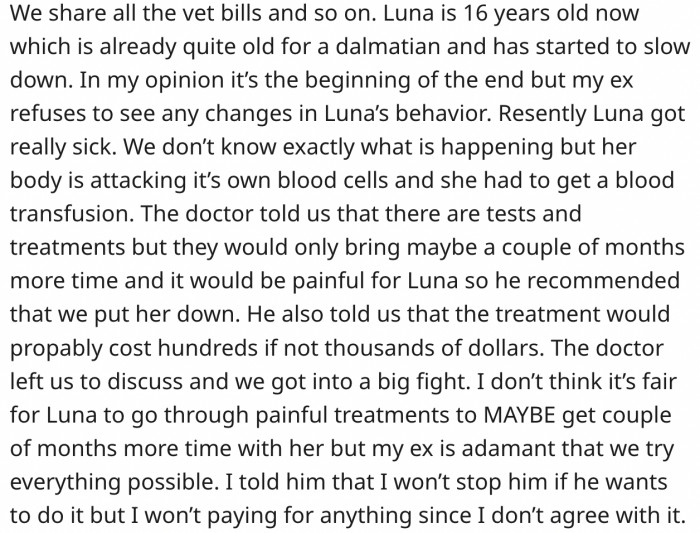
Is she wrong for not wanting to prolong her dog's life? Reddit responds.
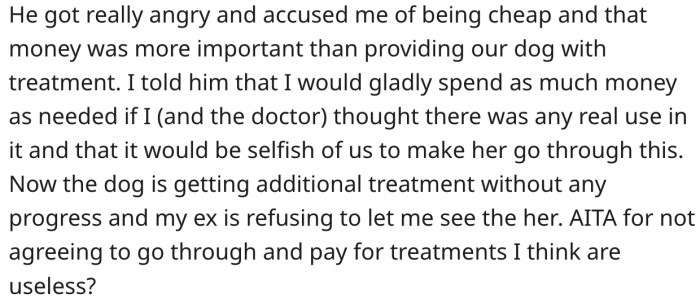
Ethical Considerations in Pet Healthcare
The decision to deny treatment for a pet raises significant ethical questions about responsibility and compassion.
Dr. Emily Carter, a bioethicist at Stanford University, argues that pet owners must consider the quality of life for their pets when making healthcare decisions.
Research indicates that ethical dilemmas in pet care often reflect broader societal values regarding the treatment of animals and their intrinsic worth.
Her ex is having difficulty saying goodbye.

She shouldn't be splitting bills with her ex.
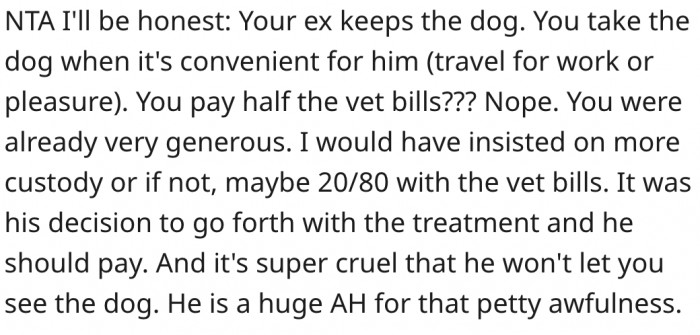
Putting the dog down was the best thing.

Pet owners face emotional turmoil when considering expensive treatments that may only extend a pet's life by a short period.
Research from the Journal of Veterinary Internal Medicine shows that the emotional strain of such decisions can lead to significant mental health challenges for owners.
Understanding these pressures can help pet owners approach decisions with greater clarity and compassion.
Her ex isn't handling the situation well.

Her ex's decision to continue treatment is understandable.
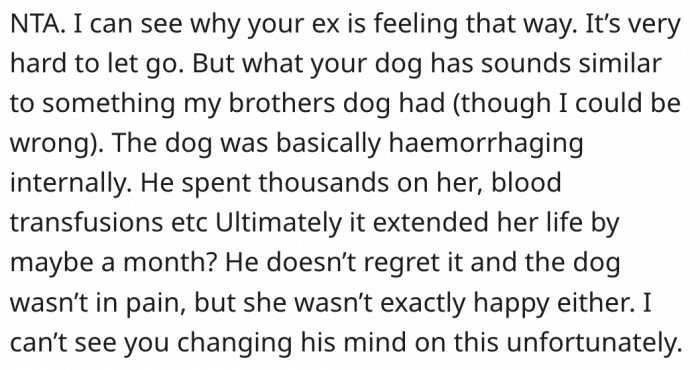
Letting the dog suffer isn't worth it.
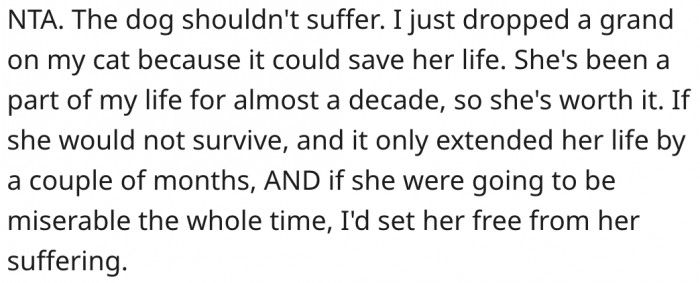
Exploring Alternatives to Expensive Treatments
When faced with difficult healthcare decisions for pets, exploring alternative options can be beneficial.
Veterinarians often recommend palliative care as a compassionate approach that focuses on maintaining quality of life rather than aggressive treatment.
Studies have shown that many pets can thrive with such supportive care, providing comfort without the stress of invasive procedures.
Her ex is not considering what's best for the dog.

Letting Luna suffer pain is cruel.
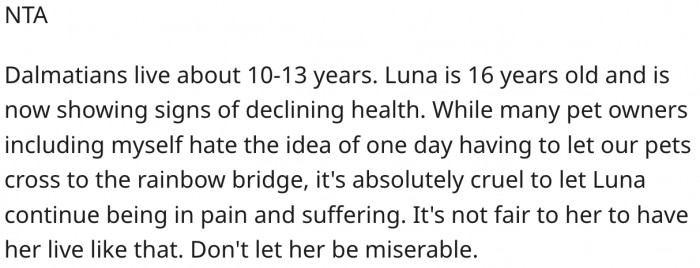
Actions have consequences.
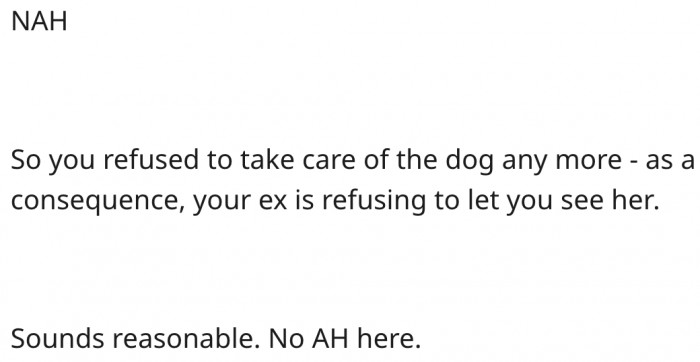
Engaging in open discussions with veterinary professionals can also help clarify the best course of action.
Research highlights that effective communication between pet owners and veterinarians can significantly impact decision-making processes.
By understanding all available options, owners can make informed choices that align with their values and the pet's needs.
She's right, but her ex isn't wrong.

Her ex took advantage of her by splitting bills with her.

Her ex is overreacting.

Knowing when to let go is part of being a responsible dog parent.

They are both right.

Don't run into debt trying to save a dog.

Goodbyes are hard but necessary sometimes.

As long as he's footing the bills, nothing is wrong here.

Her ex should prioritize the dog's best interest.

She should get the vet to explain to her ex why it's a bad decision.
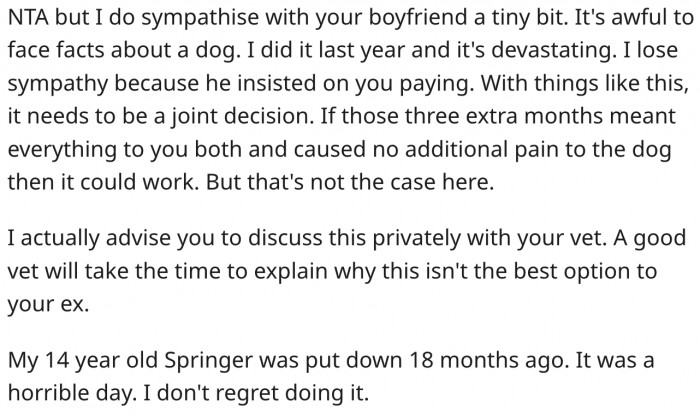
Letting her go is the humane thing to do here.

She made a reasonable decision by refusing to extend the dog's suffering.
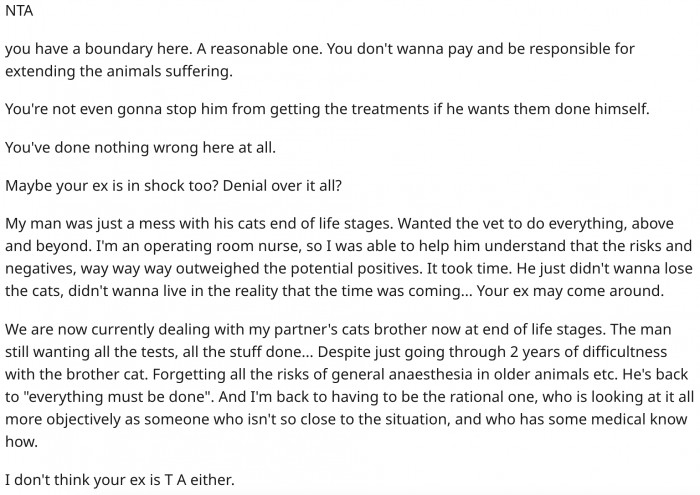
Her ex is just not ready to let the dog go.

What Do You Think?
It is easier to agree than to disagree because many people often lose it when things don't go their way. However, just because disagreements are difficult doesn't mean you should be a pushover.
It is important to speak your mind and adhere to your beliefs. What do you think was the right thing to do?
Psychological Analysis
This situation illustrates a common struggle among pet owners between financial constraints and the desire to provide the best possible care.
It's essential for owners to reflect on their values and the quality of life for their pets when making these challenging decisions.
Analysis generated by AI
Analysis & Alternative Approaches
Ethical considerations in pet healthcare are complex but crucial for ensuring the well-being of animals.
As noted in veterinary research: 'Compassionate care and informed decision-making are essential for navigating difficult choices regarding pet health.'



